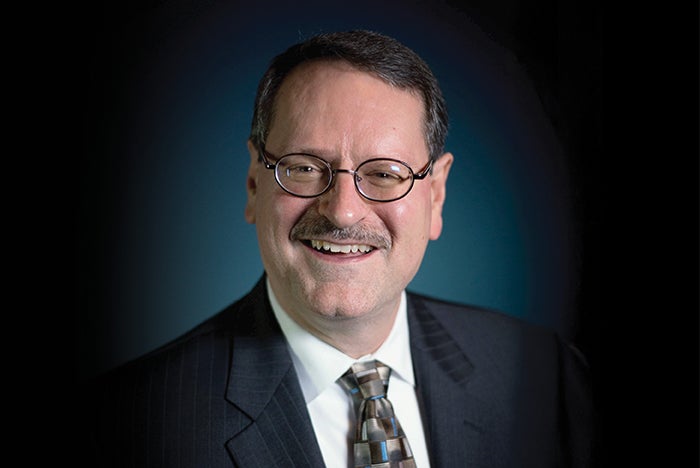Former ASHE executive shares career knowledge

The Dale Woodin File
CV
- Vice president of professional membership groups at the American Hospital Association (AHA) (2016 to 2021).
- Executive director of the American Society for Health Care Engineering (ASHE) (2006 to 2016).
- Deputy executive director of ASHE (2000 to 2006).
- Director of facilities management at Northwest Community Healthcare in Arlington Heights, Ill. (1994 to 2000).
- Electrical/biomedical engineering manager and biomedical engineer at Northwest Community Healthcare (1982 to 1994).
Accomplishments
- Certified Health Care Facility Manager.
- ASHE Fellow.
- ASHE President’s Award recipient.
- AHA Performance Excellence Fellow.
Education
- Bachelor’s degree in biomedical engineering from the University of Illinois Chicago.
Dale Woodin, CHFM, FASHE, brought a wide range of experiences to his role as lead author of the American Society for Health Care Engineering’s Effective Health Care Administration for Facilities Managers handbook. In this interview, he talks about some of the key issues.
How important are soft skills in effective administration, and how can facilities professionals develop them?
Soft skills grounded in human interaction are critical for effective administration. Regardless if it’s with members of your team, your peer directors or your executive leadership, relationships are formed and strengthened through communication, collaboration and trust. The good news is that there is no lack of information about soft skills, and Health Facilities Management’s “Power Skills” series is a great starting point for identifying skills and deploying them. Once you know what to look for, you will notice these skills displayed by leaders within your organization and see them successfully used to lead difficult conversations, reach consensus, achieve buy-in and steer a path forward. However, reading about soft skills is not enough. The key to mastering these skills is practice. If you seek opportunities to apply these skills every day, they will become second nature.
What are some strategies for demonstrating the value of the facilities department to health care executives?
Much of the equipment that drives operations is invisible to executives: behind walls, above ceiling tiles and in the basement. Opening your department to executive leaders and inviting them to experience the facility’s inner workings goes a long way to counteracting an “out-of-sight, out-of-mind” attitude. When you take executives behind the scenes, they can see the complicated systems and meet the professionals who keep them running. The more they see your people in action, the better they can appreciate all your team does to keep the facility safe, efficient and ready for patient care.
Tours are a great initial step, but you have to work to maintain this awareness and to continually demonstrate value. One method is through monthly reporting of key performance metrics. Executives appreciate the power of numbers. Organizing metrics into a dashboard can reveal things in a straightforward, easy-to-understand format and can be the starting point for conversations about systems reliability, resiliency and efficiency.
The Triple Aim framework is used by many organizations to track success, organized around better patient health, improved patient satisfaction and lower costs. The facilities department can use these three categories to develop the metrics it will track and share with executives. In addition to monthly dashboards, annual reports can shape the narrative of the facilities department’s support of the organizational mission.
Be mindful that executives have broad knowledge but limited time. Save urgent access requests for emergencies. Use a standard format such as an SBAR (situation, background, analysis and recommendation) for written reports using straightforward language.
How can facilities professionals prove their personal value to executives?
Leaders quickly identify who they can and can’t trust. Learning to consistently display personal and professional credibility encourages executive leaders to trust you. With this comes the expectation of proven performance: delivering on commitments, on time and on budget; making good, timely decisions; and being visible and accessible.
Once trust is earned, you can encourage executive leaders to share any facilities-related concerns they have that could impact the organization’s ability to provide high-quality care. This is especially true for emergencies and security threats. Whenever any of these situations impact another organization, the natural questions from your executive leadership will be: “Could that happen here? And if it did, what would we do?” This is an opportunity to initiate a conversation, provide your assessment of the situation and relate it to the current level of readiness and state of preparedness of your facility. If they learn to rely on your knowledge, they will be able to better understand the vulnerabilities that result from ignoring or reducing capital renewal requests.
Being a trusted informational resource is not just limited to emergency situations. Dedicate the time to stay current on industry news — emerging technologies, regulatory or practice changes and so on — and you will position yourself to engage in meaningful discussions with leadership on the impact emerging issues may have on the organization’s strategy and objectives. When you demonstrate that you are a broad thinker and technical expert, leaders will seek your opinions and insights into issues beyond facilities management and construction.
What advice would you give to facilities professionals in the hiring of their staff?
Working closely with your human resources (HR) specialist will greatly improve your odds of making the right decision. The first step is to ensure that the job description is accurate because it affects performance expectations, assessments and, when necessary, improvement or corrective actions. These should be carefully written and completely reflect the job being performed. When you update an existing or draft a new job description, your HR specialist can ensure that it objectively describes the value of the role. The next step is the pay grade evaluation, which often considers knowledge requirements, problem-solving skills, responsibilities and accountabilities. The better you understand the criteria for pay grade evaluation, the more successfully you can advocate that your team members are fairly and competitively compensated.
Your HR specialist saves you time by triaging applications, so you are only reviewing strongly qualified candidates. They will manage the logistics of scheduling interviews and provide expert advice on each candidate. Your HR specialist can streamline your decision-making process, but the success or failure of a new hire is your responsibility. Your team will be greatly impacted by your decision, so you owe it to them to be fully engaged.
What are some strategies for retaining facilities employees after they’re hired?
Take care of them, ensuring they receive fair compensation and benefits. In today’s labor market, other businesses are seeking to lure skilled and experienced staff away with higher wages. You need to advocate to HR for matching those offers or offering some alternative compensation to persuade key employees to remain in your organization.
The monetary aspect is vital, but other factors can contribute to retaining valued employees. The first is open and direct communication. This is especially important during the annual performance appraisal process. This time is dedicated to one-on-one conversations focused on their strengths, concerns and opportunities for improvement. Make the most of this time to listen, engage and ensure they have a long career on the team.
The second is a clear pathway to advancement. Promotions are the most significant way to recognize top performance. When an employee has the ambition to move up, it is an opportunity to motivate them toward taking on more responsibility and learning new skills. That said, promotions should be contingent on your confidence that the team member will continue their superior performance in their new role, rather than rewarding past performance.
Michael Hrickiewicz is editor-in-chief at Health Facilities Management magazine.




